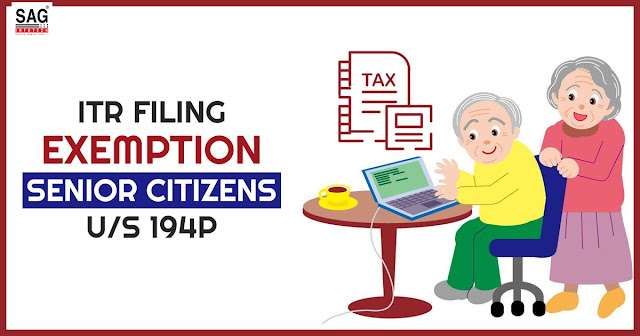This year the senior citizens of age over 75 years and above would not need to furnish their ITR as announced in budget 2021. The government inserted section 194P in the Income-tax Act, 1961.
As per section 194P, the senior citizens would not be needed to furnish the income tax return when they fulfil the below-mentioned criteria:
- The senior citizen should be a resident in India and is 75 years old or more in the previous year, FY 2021-22.
- He secures the pension income and no additional income. Subsequent to that he might pose an interest income via the same bank where he obtains his pension income.
- The bank where the pension and the interest income would obtain would be mentioned by the government.
- he would be needed to provide the declaration to the stipulated bank. The declaration would include particulars in the form and be validated in these ways as mentioned.
These individuals would come beneath the two classes who are not needed to file the taxes and the others who are needed to file the taxes. After that, the specified bank would deduct the taxes according to the details mentioned via senior citizens.
The government would provide a notification for the same dated 2nd September 2022 providing the meaning of the specified bank. According to the notification, a senior citizen would submit the declaration to any scheduled bank.
"A senior citizen who fulfils the criteria as mentioned under Section 194P will not be required to file ITR. This will be done if he/she has submitted a declaration to the bank to deduct TDS from their income in the previous financial year i.e., during FY 2021-22. If the declaration has not been submitted by the senior citizen during the last financial year, then the senior citizen will be required to file his/her ITR." the tax expert mentioned.
How Would The Taxable Income be Calculated Under The New Section 194P?
A senior citizen would be needed to file the declaration through Form no. 12BBA. Once the submission of declaration is done by the senior citizen then the bank would do the deductions, tax-exemptions, and repayment u/s 87A that a senior citizen is qualified to have the net taxable income. The bank would deduct TDS for the senior citizen's post to acknowledge the deductions and reimbursements.
On the submission of the declaration, the bank questions the senior citizen to issue the proof of deductions along with the tax exemptions for which the individual is eligible. The same would be needed when he or she chooses the old income tax regime. When the senior citizen chooses the new income tax regime, there is no need to submit investment proof.
As per a tax expert "It is important to note that once an individual submits a declaration to the bank, then he/she will not be able to change the income tax regime."
A TDS Certificate Must be Provided by The Bank
The bank would issue Form 16 towards tax deducted beneath section 194P. You must remember that it is the identical TDS certificate that is being provided through the employer to his employee towards the deducted tax on the income of the salary.
Form 16 would be edited through the income tax department in 2021. Form 16 specified the pension payment order number of the senior citizen as well as additional information such as PAN, address, and others.


Comments
Post a Comment